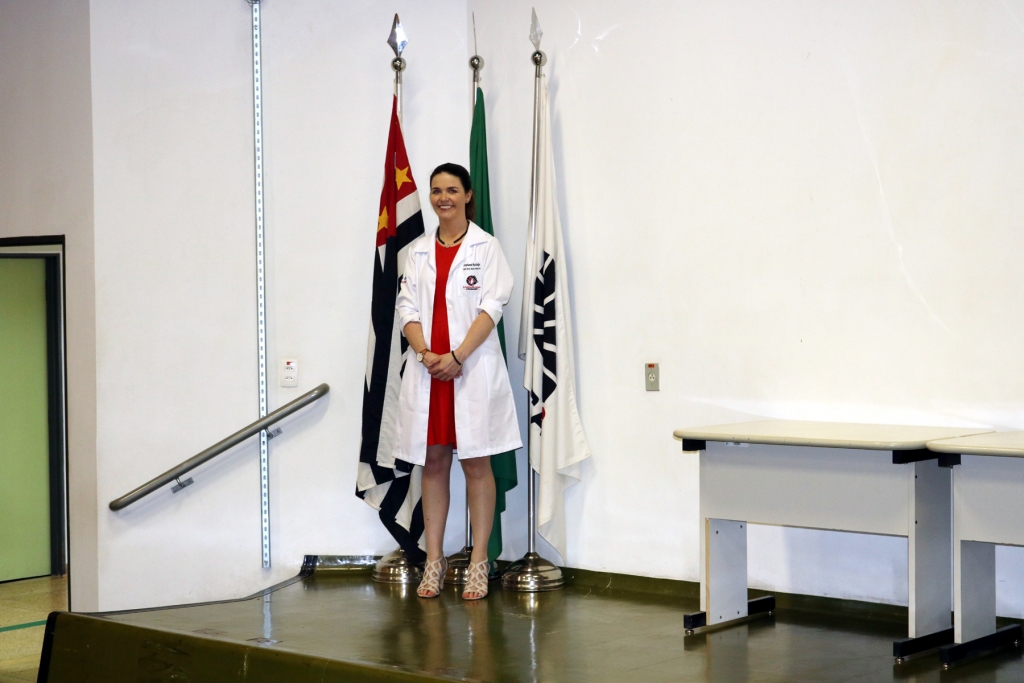SMS - Unicamp received a recently graduated medicine resident from Massachusetts General Hospital
On May 2019 the Division of Cardiology of School of Medical Sciences (SMS) of University of Campinas (Unicamp) received Dr. Stephanie Rutledge for one-month rotation. Dr. Rutledge is originally from Ireland; she grew up and went to medical school in Dublin prior to moving to the USA three years ago, where she was recently graduated as medicine resident at Massachusetts General Hospital, Boston, USA.

She spent one month doing a cardiology rotation at Hospital das Clinicas, Unicamp, under supervision of Prof. Otávio Rizzi Coelho Filho, who previously trained at Harvard Medical School and Brigham and Women’s Hospital. Prof. Otávio continues to do research with several of the cardiologists in her institution, which is how she was put in touch with him.

She told:
“I had never been to Brazil, or even South America before so I was very excited about the trip. I chose to do my elective at Hospital das Clinicas because my mentors in Boston recommended spending time in the Cardiology Division at Unicamp, working alongside Prof. Otávio. I was also curious about the differences I would encounter in health systems, between Brazil, the U.S. and Ireland. My month consisted of a broad variety of exposures – for instance, every morning I rounded in the ICU with the cardiology residents and faculty.
I enjoyed hearing about the overnight cases; sometimes patients had been thrombolyzed at an outside hospital due to distance from a facility equipped for PCI, which I had never seen before. We also discussed all the interesting echocardiograms, ECGs and caths from the past 24 hours – this was an amazing way to impart knowledge to all the residents, using teaching cases, and I hadn’t encountered anything like it before. In the afternoons, I spent time on the cardiology ward or in clinic, seeing patients who had coronary artery disease, valvular disease, heart failure and some who had undergone a heart transplant. I encountered lots of patients with Chagas disease – this was my first time seeing as case of Chagas as it is quite rare in the U.S.!

I was privileged to witness multiple different health systems in Campinas. I spent the most time in the university hospital (Hospital das Clinicas), which is very academic with a strong emphasis on clinical research. I was struck by the fact that even in a low-resource setting (for example, often the physicians’ first choice of medication for the patient was not available), the hospital provided high-quality evidence-based care to all of the patients, regardless of their ability or inability to pay. I was impressed by the dedication to research and scientific discovery; some of the clinicians I met dedicated hours of their time outside of the hospital to conducting clinical trials and writing manuscripts. I had a very unique experience, during which I visited a “centro de salud” with Prof. Otávio every Thursday afternoon.

There we supervised medical students from Unicamp who were delivering primary care to underserved patients with no insurance. This is a state-run system, and so diagnostic tests take some time to result and the free medications are limited, but the spectrum of medical conditions was very interested. I met patients with diverse symptomatology and pathology, and I really enjoyed teaching the medical students.
I also spent an afternoon at Centro Medico de Campinas, which is the “private” hospital. I was struck by how beautiful the institution was, and all of the high-tech medical equipment. Their ICU functioned akin to that of Mass. General, with practically every intervention available to patients – it felt worlds apart from the “centro de salud” and hard to believe that they were located just a few miles apart.
I love teaching and I was thrilled to be allowed deliver a two-hour lecture on the congestive heart failure to the third-year students with Prof. Otávio. I did a case presentation about a patient I had encountered during residency in Boston. There were about 100 students at the lecture, and I delivered it in English (as my Portuguese is very very limited) but they seemed to understand it and asked questions. The capstone of my rotation was when I was invited to give grand rounds by the cardiology department; it was a true honor to be able to speak to them about my journey so far.
One weekend, we traveled into Sao Paulo where Prof. Otávio was delivering a presentation at the Jornada Paulista de Radiologia. I had no idea it would be such a huge conference!
The cardiology residents were a dynamic and exuberant group of people whose energy was contagious! They took me in as one of their own, translated for me during rounds, made sure that I came with them for meals, and even dropped me home from the hospital. They were some of the most inclusive and generous people I have ever met; my time in Brazil was truly enhanced because of them and they have shaped my outlook on life. I will try to always be as kind to others as they were to me.
This was truly a once-in-a-lifetime experience. To be able to spend a snapshot of time in the Brazilian health system was a true privilege, and I will never forget my time there.”, concluded Dr. Rutledge.
Rad more (in Portuguese)
Residente de Havard faz intercambio no HC da Unicamp
